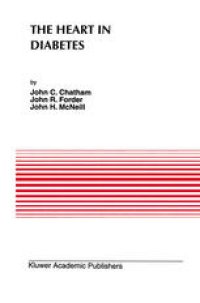
Ebook: The Heart in Diabetes
Author: Frederick S. Fein (auth.) John C. Chatham D.Phil. John R. Forder Ph.D. John H. McNeill Ph.D. (eds.)
- Tags: Cardiology
- Series: Developments in Cardiovascular Medicine 185
- Year: 1996
- Publisher: Springer US
- Edition: 1
- Language: English
- pdf
Diabetes is a major public health problem which is expected to affect 160 million people worldwide by the year 2000. Clearly an understanding of the effects of diabetes on the heart is an important step in the development of strategies to reduce the incidence of heart disease for diabetic patients, thus increasing their overall life-expectancy and quality of life.
In this book, the editors bring together the different lines of evidence supportive of the idea of a diabetic cardiomyopathy. The first chapter provides an overview of the impact of cardiac dysfunction on the mortality and morbidity of the diabetic population in general, as well as a presentation of clinical aspects of heart disease in diabetes. This is followed by chapters concerned with the pathological and functional changes that occur in the heart as a result of diabetes and a description of the various therapeutic interventions that are available to reverse the effects of diabetes on the heart. Subsequent chapters focus on changes in protein synthesis, membrane function and intermediary metabolism that take place following the onset of diabetes. Since these alterations precede many of the functional and pathological changes, it may be that the processes responsible for the functional decline and tissue injury are initiated by diabetes-induced changes at the cellular and/or biochemical level.
Diabetes is a major public health problem which is expected to affect 160 million people worldwide by the year 2000. Clearly an understanding of the effects of diabetes on the heart is an important step in the development of strategies to reduce the incidence of heart disease for diabetic patients, thus increasing their overall life-expectancy and quality of life.
In this book, the editors bring together the different lines of evidence supportive of the idea of a diabetic cardiomyopathy. The first chapter provides an overview of the impact of cardiac dysfunction on the mortality and morbidity of the diabetic population in general, as well as a presentation of clinical aspects of heart disease in diabetes. This is followed by chapters concerned with the pathological and functional changes that occur in the heart as a result of diabetes and a description of the various therapeutic interventions that are available to reverse the effects of diabetes on the heart. Subsequent chapters focus on changes in protein synthesis, membrane function and intermediary metabolism that take place following the onset of diabetes. Since these alterations precede many of the functional and pathological changes, it may be that the processes responsible for the functional decline and tissue injury are initiated by diabetes-induced changes at the cellular and/or biochemical level.